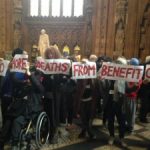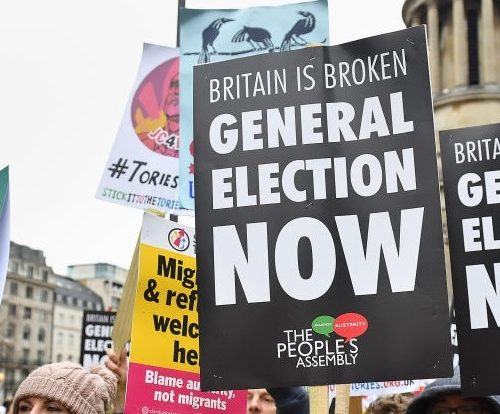BREXIT : THE EXHAUSTION OF CAPITALISM AND THE NEED FOR A SOCIALIST PERSPECTIVE – There is no reason to choose between Brexit and Remain. This is not a choice. It is a dichotomy that was imposed to get us divided. The Brexit predators who drive this are not strong. Look how they all fall out between themselves! The conditions exist to bring the Tory government down, whether through elections or by mobilising the suffering population, the working class and the trade unions.
Jeremy Corbyn’s resistance to a second referendum must be supported as the Tories – both of the Brexit and Remain variety – use it as a weapon to confuse and divide the Labour Party. The task of developing Britain needs the unification of the progressive movements not just in Britain but on the scale of the European continent. It is urgent to start upon this task therefore. And in the progressive movements, one must not forget to include all the national and international anti-war movements.
The decision to leave the European Union was agreed by referendum on 23 June 2016, by 51.8% against 48.2%. On 25 November 2018, The Tory government of Theresa May signed a preliminary Brexit accord with Jean-Claude Juncker for the European Commission. This accord, if/when agreed by the UK parliament, will remove the UK from the EU but will keep the country temporarily in the European Customs Union through what has become known as ‘the backstop’.
In January 2019, the British Parliament opposed the preliminary accord overwhelmingly: The Brexiteers because it is a half-Remain document, and the Remainers because it is half-Brexit one. In the country, the accord is despised for the way the UK loses all its rights in the EU whilst it still partially stays in it.
The capitalist class is in uproar because it cannot suddenly stop trading with the EU on the present terms. The most determined Brexiteers reckon that if no accord has been voted by parliament by 29 March, the country should simply ‘crash out’ out the EU and start trading on WTO terms. The Trade Unions and the general population fear that this will lead to price rises and shortages.
As for the most determined Remainers, they are often in the Conservative Party. These call for a new referendum, partly to reverse the Brexit decision taken in 2016 and partly to keep the climate of confusion and division in the Labour Party, hoping to attract to their conservative side a whole layer of Labour Remainers who have no objection to the neo-liberal structure of the European Union. This is turning into a war of the Conservative Party and government on the Labour Party, to separate the left of the Labour Party from Jeremy Corbyn, and eventually get him out of the Labour leadership.
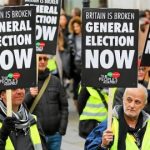
Supported by the TUC and major Trade Unions like Unite, the Corbyn leadership keeps to its view that a general election is preferable – ‘a priori’ – to a new referendum. This seems sensible since a second referendum can only further infuriate and madden one side or the other, whatever the new result.
In fear of possible riots, risings and rebellions, the government has put a £2 billion contingency fund at the disposal of certain ministries, and 3,500 soldiers on standby “to deal with any disruption” [1].
As Brexit bring a new life to the unresolved problems of the past, like Ireland’s partition and the Scottish’s referendum, capitalism finds itself with fewer and fewer means to resolve them.
The anarchistic and violent nature of the profit motive creates social antagonisms so irrational, so inhumane and so adamant that the answer can only lie in preparing the Labour Left and the Trade Unions for alternatives: the planned economy, the federation of the British nations, the Socialist Republic [2], etc.
Collapses and reorganisations in the capitalist system :
The Brexit negotiations pour petrol on the fire of the commercial wars now returning to Europe and the world. The Brexit idea strikes at the political and military cohesion of world capitalism just as the latter makes world war on Russia and China. For European capitalism, Brexit weakens its competitiveness against the United States and Asia. As for British capitalism, Brexit means retreat and loss in the face of European competition, and a greater dependency on the United States. Everything connected with Brexit speaks of collapses in the world capitalist structures and of inauspicious reorganisations within it.
The minister to International Trade, Liam Fox [3], says that Brexit “can be the means” through which “the UK will be champions of free trade in the world”. He speaks of unique commercial opportunities awaiting Britain in the United States, Canada, Japan, Australia & New Zealand, Singapore, the Caribbean countries, some African ones and even China. However, the general tendency of the world is to ‘pivot’ towards Russia or China, not towards the UK or the US.
Considering how British imperialism was once the greatest power in the capitalist world, it is logical that the UK should be particularly affected by the long agony of imperialism today, worldwide. Built upon colonial expropriation and pillage, the relations between the British nations – England, Scotland, Wales and Ireland – (not to forget Gibraltar, the Malvinas, etc.) carry laws of domination and suppression that the Brexit upheaval can only exacerbate [4]. The impasse of the ‘backstop’ points to the impossibility of a ‘full’ Brexit even if the country ‘crashes out’, as they say. Such is the reality of our globalised world.
On 9 December 2011, 26 EU countries signed the European Fiscal Compact in Brussels. Each EU member accepted the supervision of the European Council over their finances, for the sake of building a proportional and collective ‘fire-wall’ against a future credit crisis. The British Prime Minister David Cameron refused to sign; he did not believe in collective organisation, and even less in transferring to anyone the UK’s ‘sovereign right’ to supervise its own finances! This event contributed to the creation of the word ‘Brexit’ which appeared in the medias early in 2012.
One of the origins of ‘Brexit’ goes back to the 2008 crisis, the unprecedented banks bailouts and the Fiscal Compact. When the ‘prudential fire-wall’ was set up in the EU, the big banks and the money-lenders showed all their insolence. What became apparent too was the competitiveness, the arrogance and the individualism of each nationalism in the EU. If the 26 EU countries eventually signed the Fiscal Compact, it was only through their dread of a new financial crisis, and at the cost of losing the UK, their 27th member.
A reorganisation inside capitalism :
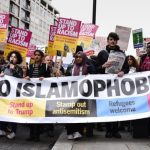
The right and extreme right-wing organisations like UKIP and Britain First exist outside the Tory Party, but they contribute a lot to the slide of that Party to the right. After the occasion in Brussels where Cameron broke ranks with the EU, Nigel Farage of UKIP denounced the “monstrous Eurozone” and the “the lack of British sovereignty” in the EU. By 2012, UKIP’s anti-austerity campaigns had become anti-immigration ones, and with the EU to be blamed for its “free movement of persons”, UKIP’s anti-immigration campaigns became pro-Brexit ones.s
When UKIP held two of its national conferences in Doncaster (2014 and 2015), Farage denounced the level of immigration in that area and “vowed to bring down Labour and the entire political class” [5]. He also wanted his Party to “dedicate itself entirely to break the political union with Europe” [6]. In the run-up to the 2016 Brexit referendum, Farage’s motto “We want our country back!” was then adopted by all the right wing sector.
Brexit is not just the product of the big crisis of 2008 therefore. Or of the financial rivalries between the European capitalists. It comes from a political evolution too. Seen from the international point of view, you could say that the small capitalist layer that has already the power to pocket most of the world’s wealth, is the same layer that dominates high finance and the world’s industries of armament – and war therefore. This small layer uses lobbies to impose itself, but if it wanted to take power on a world scale, it would undoubtedly say, like Farage, that it wants “to bring down Labour and the whole political class”.
Brexit highlights the slide rightwards of British capitalism as a whole. This transformation strengthens the military links between the UK and NATO, and may already be emanating from those links. On 5 October 2018, Theresa May found the time to sign a military pact in Germany that committed the UK “to reinforcing the European pillar in Nato to guarantee our common defence” [7].
The left Brexiteers :
In the referendum, Brexit won over Remain by 3.8% points. In the socially distressed communities of the North, North-East, Yorkshire, Humberside, the Midlands and Wales, it won by larger amounts, like 4% and 5%. The mines, the steel plants and the old industries have closed. New plants have taken their place, but they are automated and do not need many workers.
Statistics show that, after 2004, various employers and even the State encouraged, or authorised, the entry of many workers from the rest of Europe, as from Poland for instance. Jeremy Corbyn analyses that the Brexit vote in the areas mentioned above voted Brexit to express their rejection and indignation against ‘the neo-liberalism’ of the European Union. It is a fact that immigration was used – by the European and British capitalists – to lower the wages throughout Europe. Barry Gardiner (Shadow Trade Secretary) commented that, for a miner on the dole, the EU has represented no protection whatsoever.
Some left wing parties and organisations chose to vote Brexit. They tended to view the EU as a vast multinational which does not bring countries together for the sake of progress but for the sake of profit. These organisations condemned the Lisbon Treaty whose structures favour privatisation and stand in the way of nationalisations. This analysis is surely correct, but it glosses over the counter-revolutionary significance of the motives behind Brexit.
Brexit in the working class :
In the last few years, the medias progressively normalised the xenophobic ideas of UKIP (and others like UKIP). With time passing, the capitalist class decided to have everyone forget the responsibility of the banks in the 2008 crisis. But who emptied the State’s coffers? The banks, and not the immigrants! To help in having this forgotten, and even denied, the bourgeois class manipulated public opinion. In 2014, The Times named Nigel Farage “Briton of the Year”. Soon after the 2016 Brexit result in the referendum, Farage won the right to present his own LBC Radio Show, for one hour every night. He worked from that position, and still does, to exalt the extraordinary capacity of the Britons (the White ones), show contempt for ‘the other’ [8], and create the new “British-born” category of human being.
In 2013, UKIP won 147 posts of councillors in local elections, but this was not from the de-industrialised regions mentioned above. UKIP managed to send 24 MPs to the European Parliament; but according to the Centre for International Research YouGov, these gains came from the right wingers leaving the Tory Party, the disintegrating LibDems and a small working class layer that normally votes Tory.
A study carried out after the general elections of 2017 found that only 1/3 of those who had just voted Labour, had supported Brexit in the referendum the year before. Generally speaking, Remain has been the position of the Trade Unions and Labour Party. In these organisations, the lack of mass debates between the ordinary workers, and the lack of trade union-Labour study-circles open to all, left almost all the political scene to the Brexiteers, their lies and their prejudices.
As a class, the working class does not support Brexit. What it lacks, is the political and edifying means to defend itself properly from it.
The Remainers and the Labour Party:
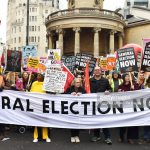
In the referendum campaign, Jeremy Corbyn had adopted the slogan: Remain and Reform. He often criticises the ‘neo-liberalism’ of the EU and has referred to a “social Europe” [9]. The big Trade Unions generally line up behind Corbyn’s voting advice, showing the authority that he has in the working class and the desire of the latter to encourage the Labour left.
During the referendum campaign, J Corbyn demanded that the origin of the Calais ‘Jungle’ be traced back “to its source, which are the wars and the conflicts”. The capitalists deny that their wars and bombings help create refugees; they hate this Jeremy Corbyn who dares hold them to account in this matter. They want Corbyn extirpated from Labour, and from politics.
Not all the Tory MPs are Brexiteers. There are many who support Remain or tend towards it. Brexit has given them the opportunity to try and make parliamentary and social alliances with the Remainers in the Labour Party. Altogether, these Tory and Labour Remainers have the power to mobilise hundreds of thousands of people in the streets [10]. Behind their demand “for a second referendum” (which they call hypocritically The People’s Vote), the Tory Remainers attract towards them the right-wing Labour Remainers (and Blairites) — against the wishes of J Corbyn who demands ‘a general election’ instead. This is how the capitalist class weighs directly in the Labour Party. It draws towards itself the Labour bourgeois and bureaucratic right-wing, to defend tactical moves in opposition to the Corbyn leadership.
Not all Labour Remainers allow themselves to be so manipulated by the Tories; but those who do, organise openly in the Labour Party and with impunity. They have publications and electoral slates. They take part in fake accusations of anti-semitism to get the members of the Labour left disciplined by the Labour Party. These anti-Corbyn Labour types are often middle ranking officials. In a recent demonstration where they joined the ranks of Tory Remainers, they carried the Labour banners that one never sees in any workers’ strike. In the 2017 general election, they called ‘for a Labour vote’ without any mention of Corbyn’s name, picture or Manifesto.
As we said above, the Corbyn leadership was initially for Remain (Remain and Reform), but it accepted the Brexit result after the referendum. It then formulated the idea that, from outside the EU, Labour would seek re-entry into the European Customs Union and Single Market on new terms. Jeremy Corbyn says that he will demand, as part of the new terms, that the democratic liberties be restored, respected and enlarged, along with working class rights and environmental protections. All this being absent from the Theresa May’s preliminary accord.
Remain in the UK’s nations and parties :
The Remain vote was stronger in the large towns and cities (like London) than in many surrounding regions. Remain was the general result in Scotland and Northern Ireland, perhaps to keep apart from ‘English’ tutelage? The Scottish nationalist leader Nicola Sturgeon threatens to organise, should Brexit come to pass, a referendum in Scotland to seek the independence of this nation from the UK. In Northern Ireland, Sinn Fein has recently declared that it will use clauses in the Good Friday Agreement [11] to work towards a referendum for the reunification of Ireland.
Although the Tories originated the Brexit idea, not everyone is a Brexiteer in the Tory Party. The latter is tightly linked with European capitalism to which it belongs. Its leader Theresa May tries to stop the Party splitting between its Brexiteers [12] and its Remainers [13]. This would explain, in part, why she clings so inflexibly to her half-Brexit/half-Remain preliminary accord. Many Tory Remainers, like the Labour ones, view Brexit as a defeat, a huge step backwards, an admission of defeat and a great humiliation. They believe that Brexit is going to produce senseless commercial alterations, and at immense costs. Although of course, it is the masses who will pay the costs.
Removed from the EU, the UK can only get closer to the US :
At the start of the Brexit negotiations, the May’s government had promised a complete separation between the UK and the EU. But this total rupture (that the Brexiteers had demanded for months) was going to prove unattainable in practice.
Should a ‘full’ Brexit be implemented, the new EU frontier will pass between Northern Ireland and the Republic of Ireland, lending new life to the partition which British imperialism imposed on Ireland in 1921. The purpose of the partition had been for British capitalism to divide Ireland and rule it. With the signing of the Good Friday Agreement – and the EU commercial rules applying to both Northern Ireland and the Republic in the South – the line of partition had become blurred to a certain extent. This had not satisfied the nationalist demands of Sinn Fein, but it had helped to damp down the antagonisms.
The backstop:
Any true Brexit restores a frontier between the two parts of Ireland, as we said. Fearing the revival of nationalist and revolutionary sentiments in this part of the United Kingdom, and therefore in this part of Europe, the UK and EU capitalist negotiators tried to avoid re-partitioning Ireland. Jean-Claude Juncker suggested that Theresa May could let the existing European commercial rules continue to apply in Northern Ireland. She rejected this furiously, probably seeing here an unacceptable loss of British sovereignty, as well as the insidious advance of European competitive interests in ‘British’ Northern Ireland.
The problem was apparently resolved when Theresa May decided to keep the whole of the UK in the European Customs Union – and therefore Northern Ireland as well. This was called ‘the backstop’. The latter would be a temporary arrangement until a new EU-UK trade agreement could come into force. With the ‘backstop’, no frontier passes between the two parts of Ireland, certainly, but Brexit becomes a half-Remain! In parliament and in the country, this idea raised howls of anger and frustration. The Remainers screamed that the UK cannot stay partially in the EU and still lose all its rights in it! The Brexiteers shouted even louder that the backstop was put there to spite them, and that the country must ‘march out’, and ‘crash out’ of the EU right away.
The ‘crash out’ blackmail:
In the country at large, people fear this ‘crash out’ option, which could lead to all manner of shortages, price rises, the militarisation of distribution and new Tory attacks on the masses with the support of the police and the army.
In parliament, everything works as if Theresa May was waiting for the 29th of March to tell parliament: ‘Crash out’ or accept my preliminary accord’. The Remainers who demand that all negotiations should stop “to allow the UK back into the EU” are not likely to be welcomed back in there, should they try! The Brexiteers previously so keen to ‘crash out’ – like those in the European Research Group – are suddenly less vocal. In front of all this humiliation and incompetent dithering, the ruling class is fairly losing its head.
Meanwhile, the secretary of state for defence (and extreme Brexiteer) Gavin Williamson sends the HMS QE aircraft carrier to the South China Sea, although prematurely it would seem, for the Brexiteers keen on big trade with China. Gavin Williamson receives gleefully the steady deliveries of the F35s stealth-bombers from Lockheed-Martin (138 have been ordered, costing between 80 and 90 million dollars each). He might be waiting to be PM himself, but for the time being, he wants the May’s government to contribute up to 4% of GDP to Nato, as prescribed by Mr Trump.
The ‘backstop’ is an unsurmountable contradiction for capitalism:
The Tory Party is irrevocably divided between Remainers with interests in the restrictive EU, and Brexiters wanting to be free of EU exclusivity, to trade elsewhere the world. If Theresa May stays in government for a period, she will wish to implement the anti-working class programme that she mothballed previous to the 2017 elections. This will help to keep her Party together, but the Tories will still have to choose between staying in the European Customs Union or leaving it. The backstop is not about a frontier! It is about the power of the UK to engage freely in the world (read: with the US) economically and financially. The US is waging deadly financial wars against China, Iran and Venezuela (and probably the EU itself). It has every reason to strengthen the US-UK ‘special relationship’ and combine their military and financial might.
Austerity and Brexit are the two sides of the war that the ‘neo-liberalism’ of capitalism wages on ordinary people, in an attempt at surviving. The contradictions around the backstop issue give a measure of the growing social, political and constitutional impasse facing capitalism. The backstop divides the Tory Party, the government, the parliament, the country. It keeps Brexit irreconcilable with Remain. It divides Theresa May from her DUP allies. Now Parliament (part of the Legislative) wants and needs more rights against the power of the government – the Executive.
The referendum of 2016 proved that the Executive could no longer ‘execute’ without involving the mass of the population. Theresa May is not afraid of the re-drawing of a frontier, but of the new struggles that are bound to come. The complete expulsion of British imperialism from Northern Ireland looms, even if not immediately, along with the reunification of the island of Ireland. What the British capitalist leaders really fear is the return of the struggle which has already removed the British monarchy from the south of Ireland, replacing it with a Republic. The Brexit crisis is unwittingly granting to the Irish Republic new rights to speak on British affairs. Now the UK capitalists must ‘swallow’ the blackmail of their DUP class ally in the Westminster parliament, and this under the eyes of the whole world.
The ‘neoliberal’ organisation of the European Union is inimical to the interests of the working class and masses; but the EU has also produced, up to a point, the conditions through which the UK had to jettison very backward aspects of individual, local and regional nationalisms. The Unionists of Northern Ireland had to accept power-sharing with Sinn Fein. The role of the British troops in the North has been hugely curtailed [14]. This was all done in the interests of European capitalism (British included), but the Irish people are sure to be feeling fortified against any new partition. It is this political reality, and not any frontier, that scares the May government. It is this fear that makes May cling to the backstop however much it paralyses her.
Brexit was never about leaving Nato !
It is no accident that Donald Trump has applauded the Brexit idea. It is in the interests of the US capitalists to draw the UK closer to them, particularly at the level of finances, and therefore of the armaments’ industry. For the US, Brexit has the added advantage of weakening the EU, making it less able to compete and easier to dominate. It is remarkable that the nationalist, white supremacist and xenophobic language that Trump favours is not very different from that which ‘crash out’ Brexiteer Nigel Farage uses also.
The Brexit squabbles act like a screen behind which Britain is involved in 25 military operations in some 30 countries. Behind the scenes, the US and the UK reinforce their special relationship at the most advanced level of warfare, which is atomic. Hard-line Brexiteer Gavin Williamson, the defence secretary, likes to say that: “Nato is the cornerstone of defence in Europe”. His keenness to leave the EU is not a little matched by his enthusiasm for Nato.
The May’s government is purchasing a fleet of the F35 stealth jet, the only first-strike-capacity bomber that can carry and launch the new atomic bomb B61, also made by Lockheed Martin. In Oct-Nov 2018, when Brexit was occupying all the minds, Britain was taking part in the Operation Trident Juncture in Norway. The specific target of this enormous military exercise was Russia.
Britain’s almost complete domination by finance capital puts the country at the heart of the world’s armament and war industries, themselves dominated by the United States. The more Britain bends the knee to the United States, the more submitted it becomes to Nato. If a ‘divorce’ between the UK and the EU facilitates this process, it is at the expense of the economic, political and even military homogeneity of Britain (what with Scotland and Ireland for example), at the expense of the European capitalist countries increasingly divided amongst themselves, and at the expense of Nato itself which depends on the European countries remaining stable under its control [15].
The procedures to implement Brexit are poisoning and fracturing the forces of capitalism, regardless of what will eventually happen to Brexit itself. Caused by the growing desperation and debility of the capitalists, Brexit leads the latter to aberrant decisions, like ‘divorcing’ right in the middle of their epoch-changing war against Russia and China. Brexit is based on almost infantile dreams like the idea of simply ‘crashing out’ of the EU in order to go about the world, to build ‘Global Britain’ and rule the waves again!
Brexit is a more or less conscious device that the capitalist class uses, amongst others, to keep popular anger within parliamentary confines. Whilst the neo-liberal war of capitalism rages around the world, and in every country, Brexit helps to divert attention, to weaken awareness and to delay the organisation of popular resistance.
For an anti-monarchist and anti-imperialist programme :
Although this is seldom mentioned, capitalist competition and imperialist jealousies underpin the relations between the UK and the EU. These factors contribute to removing from the Brexit negotiators the ability to separate intelligently from each other. The other factor in their way is their fear. Haven’t the British nationalist, revolutionary and republican struggles already removed the largest part of Ireland from UK control? The backstop is the sum total of all these factors. It is not correct to think that an electronic frontier between the two parts of Ireland can replace the backstop – the problem not being the frontier, but the monarchy and imperialism.
Theresa May handed over £1 billon to the Ulster Democratic Party (DUP) in exchange for the 10 Ulster MPs supporting May in parliament. The latter took the money but they vote against the backstop. They are opposed to the backstop. They want Ireland partitioned because their loyalty to the British crown depends entirely on Ireland remaining divided.

In the Labour Party and the Trade Unions, the concern must be to help empower the working class in the North and throughout the island of Ireland, as well as throughout the UK. The British working class and Labour Party serve their own cause when they take the part of the working class in Ireland, North and South. The workers and ordinary masses in the North of Ireland must be let free to struggle for the Republican and Socialist reunification of the whole of Ireland. One first demand to uphold, therefore, is the withdrawal of the British troops still stationed in Northern Ireland. On the part of the left in the trade unions and Labour Party, the task is to help free the workers of all the UK nations from the partitioning restrictions imposed upon them by the capitalist class as well as by the trade union and Labour bureaucracies.
In the referendum campaign of 2014 [16] where Scotland rejected the notion of becoming independent from the UK, the Nationalist Party (SNP) originally promised to de-recognise the British monarchy and close down (or move) the Faslane military base utilised by Nato. Although the SNP dropped these proposals afterwards, this signals the presence of anti-monarchist and anti-imperialist sentiments within Scottish nationalism.
In the Brexit vote of 2016, Northern Ireland and Scotland voted to stay in the European Union, hence outside the UK. Beyond the economic interests that explain this choice, the nationalism of these two nations reflects something of their history of struggles, bloodily repressed, against the countless policies of partition, subjugation, relegation and obscurantism imposed upon them by British monarchies, aristocracies and bourgeoisies over the centuries.
In the left of the Labour Party and trade unions, the task is therefore to help develop the republican and anti-imperialist ideas which people seek, but that are suppressed. The need to unify Ireland, and Ireland and Scotland with the rest of the UK requires a new basis. The working class is the basis. The Socialist Federation of the British nations is the only way to unite all the parts of Britain. And only the socialist programme can do this.
The left in the Labour Party, the Trade Unions, the left in general, all the communist and workers parties need to draw closer together to discuss the need to build a Socialist Federation in the UK, in the EU and beyond. This can only be based on the workers struggles, the trade unions, the workers parties, the progressive parties in the UK and the EU, and beyond.
The way to transcend the Remain-Brexit binary contradiction is the socialist transformation of the UK and EU, on the basis of anti-imperialism, decolonisation and the creation of Socialist Republics.
For an anti-war and anti-austerity programme :
The on-going austerity policy is not just the result of the 2008 banking crisis. The Guardian of 7 June 2015 [17] reported how secret subsidies, fiscal rebates (and other gifts) to the biggest companies, the armaments ones in particular, were costing £3,500 to each household that year. This penalty has done nothing but grow. One must link the capitalist war of austerity with its wider ‘neo-liberal’ wars worldwide. Brexit expresses a withdrawal and a kind of defeat, but it expresses also the reorganisation of world capitalism as it becomes entirely dominated by the interests of finance and of war.
In spite of its steady weakening and decline, capitalism is not going to leave the scene! It is up to the working class and its Unions, the Labour Party left, the Socialist lefts, the Communists and the Lefts in general, in Britain, in the rest of Europe and beyond to force capitalism to quit the scene.
The Corbyn leadership is right to seek to work together with European socialist and progressive parties to help build what he calls “a social Europe” [18] – although a socialist Europe is better. This construction forms part of the struggle to defeat all the wars: the wars of hegemony abroad and the wars of privatisation and austerity. For these kill instead of building society.
